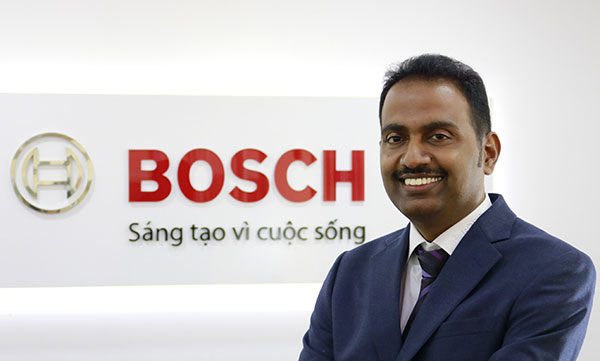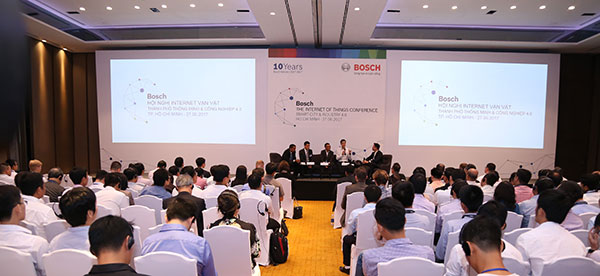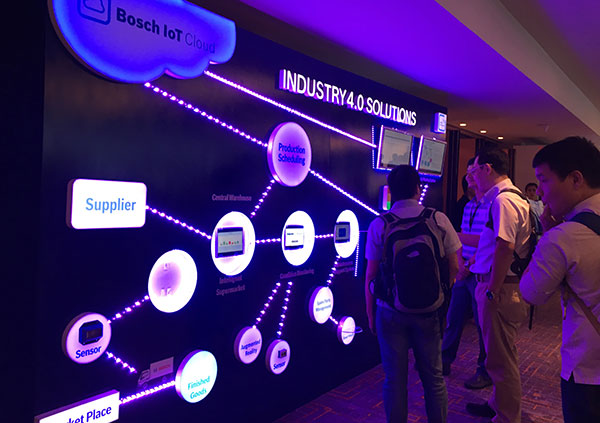Bosch looks to grow its name in Viet Nam
 |
It has been two months since you took on this new role, what are the opportunities and challenges?
Bosch Vietnam has been operating in this market for almost 10 years and Viet Nam has become one of the key growth markets for Bosch in Southeast Asia.
The company has grown from around 20 associates in the beginning to more than 3,100 associates today. These associates work in varied fields at Bosch in Viet Nam. In particular, we have high-tech manufacturing activities at the Bosch Gasoline Systems plant in Long Thanh in the southern province of Dong Nai, as well as a Technical Industrial Apprenticeship Training Centre located close to the plant.
We also have diverse sales divisions offering products and solutions to consumers and businesses: Automotive Aftermarket, Automotive Electronics, Drive and Control Technology, Packaging Technology, Power Tools, and Security Systems. Our two research-and-development (R&D) centres in Ho Chi Minh City now have more than 1,400 associates, building hardware and software solutions for the automotive industry and also connected solutions for smart cities, Industry 4.0, and more. I would say that those are the biggest advantages.
The challenges ahead would be to continue building on the past achievements, to develop new business opportunities, and to increase the market presence of all business segments in Viet Nam.
 |
What are the areas Bosch puts focus on to maximise the market potentials here?
Viet Nam’s urbanisation and industrialisation are taking off strongly. These trends offer great opportunities for us to widen our product offerings in the market. Moreover, the country is making strides to cultivate and grow a smart economy, which induces potentials for Bosch to further introduce our connected solutions for smart homes, smart cities, smart mobility, and
Industry 4.0.
Looking forward, a direction of strategic importance for Bosch is to foster more collaboration with organisations and businesses here. In Viet Nam, Bosch has its main office in Ho Chi Minh City, with branch offices in Hanoi and the central city of Danang. The global network and local presence enable us to offer local support to nationwide customers.
Particularly, we will also invest into the Bosch Gasoline Systems plant in Dong Nai, as well as increase the capacity and competency of our R&D workforce.
Last but not least, our development programmes for associates will continue, with domestic training opportunities as well as oversea assignments on short to medium terms for their career advancement.
 |
In your view, how would Viet Nam make the most out of the opportunities brought about by Industry 4.0?
An embrace for technologies and readiness for riding the tidal waves are much needed. We’ve seen positive language recently, with decisiveness at top levels about the needs for innovation. We expect that more reforms would help the country further leverage the opportunities from Industry 4.0, and become a hub for investment, R&D, and manufacturing in the region.
Yet, the challenging part lies at the “readiness” phrase, especially the human resources. Things people need to be equipped with in order to be able to stay relevant in the time of transformation include a flexibility to use all new opportunities, a lifelong dedication to learning to keep up with technological progress through professional development, teamwork, lateral thinking, inquisitiveness, and the courage to be open to new ideas and take on challenges.
Thus, it is essential for the government, business, and civil society to work hand in hand to improve the workforce’s level of education and help them secure employment.
What the stars mean:
★ Poor ★ ★ Promising ★★★ Good ★★★★ Very good ★★★★★ Exceptional
Latest News
More News
- Vietnam: A land of milk, honey, and concrete (November 12, 2017 | 18:05)
- APEC week boosts Vietnam’s appeal (November 12, 2017 | 17:56)
- APEC minister vow to boost co-operation (November 11, 2017 | 14:00)
- Japanese firms sign $5-billion raft of deals with Vietnam (November 10, 2017 | 11:00)
- First VBS kicked off in Danang (November 07, 2017 | 17:10)
- Ford’s continuing efforts to make Vietnam’s roads safer (November 07, 2017 | 16:08)
- Viet Nam is trying to improve itself: PM (November 07, 2017 | 15:34)
- PM delivers keynote speech at Viet Nam Business Summit (November 07, 2017 | 11:34)
- APEC Vietnam 2017 special publication now available (November 07, 2017 | 11:32)
- Four Vietnamese entrepreneurs to attend APEC CEO Summit (November 06, 2017 | 20:38)












 Mobile Version
Mobile Version